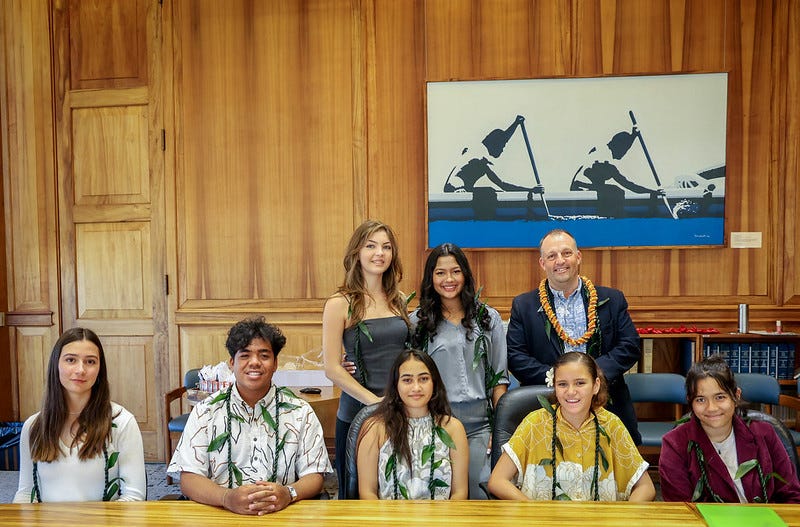“Historic” Settlement Reached in Hawai’i Youth Climate Case, Advancing Systemic Decarbonization of Transportation Sector
The settlement also recognizes right to life-sustaining climate system. And in the UK, the Supreme Court ruled that combustion emissions should be considered in assessments of fossil fuel projects.
Aloha Friday, indeed. From the Hawai’ian Islands to the United Kingdom, there is some good climate outcomes to report from the courts, and we all deserve some good news to start off our weekends, right?
First, Hawai’i has committed to take transformative action to set the state’s transportation system on the path to achieving zero greenhouse gas emissions over the next 20 years. Transportation is the largest source of direct climate pollution in the United States. In Hawai’i, the transportation sector accounts for more than half of the state’s greenhouse gas emissions, and ground transport and aviation together make up the lion’s share of petroleum usage. The geographically isolated state is heavily reliant on imported petroleum and has the highest usage of the fuel as a share of total energy consumption out of any state in the US. Hawai’i is also particularly vulnerable to climate impacts like sea level rise, coastal and shoreline erosion, flooding, and extreme heat and deadly wildfires (the wildfire that destroyed Lahaina last year was the deadliest fire the US has seen in over a century).
On Thursday, state officials including Governor Josh Green, MD and Hawai’i Department of Transportation Director Ed Sniffen joined young climate activists and their attorneys in announcing a landmark settlement agreement in Navahine F. v. Hawaiʻi Department of Transportation, a world-first youth constitutional climate lawsuit focused on addressing climate pollution from transportation. The lawsuit, filed in June 2022 by 13 Hawai’ian youth (ages 9 to 18) with support from nonprofit law firms Our Children’s Trust and Earthjustice, alleged violations of the government’s obligation to protect natural resources and of the right to clean and healthful environment under the Hawai’i constitution, through operation of a transportation system that results in substantial amounts of climate pollution. The case aimed to hold the Hawai’i Department of Transportation (HDOT) accountable to meeting the state’s goal of reaching net-negative emissions economy-wide by 2045. It was slated to begin trial on Monday, June 24.
Hawai’i Governor Josh Green poses with youth plaintiffs before announcing the settlement agreement. Photo courtesy of the Office of the Governor (via Flickr)
The trial won’t be needed with the case reaching resolution through settlement. In what is being described as a “historic agreement”, the settlement is the first of its kind in a climate accountability case, where government entities have agreed to come together in collaboration and partnership with young people to take bold climate action and ensure that youths’ constitutional rights are protected.
“Being heard and moving forward in unity with the State to combat climate change is incredibly gratifying, and empowering. This partnership marks a pivotal step towards preserving Hawai‘i for future generations–one that will have a ripple effect on the world,” Rylee Brooke K., one of the youth plaintiffs, said in a statement.
“The thirteen youth Plaintiffs in Navahine v. Hawaiʻi Department of Transportation activated the courts and achieved the first Settlement Agreement in a constitutional climate case, paving the way for systemic decarbonization of transportation. This historic Agreement offers a holistic roadmap for states and countries to follow around the world,” said Andrea Rodgers, deputy director for U.S. Strategy at Our Children’s Trust.
Under the terms of the settlement, HDOT will develop and implement numerous measures to ensure the state meets its climate goals in the transportation sector. First and foremost, the agency will develop a greenhouse gas reduction plan within the next year to serve as a blueprint for the transformation. The plan will be reevaluated every five years and will include interim emissions reduction targets that the state will have to meet. HDOT will establish a new unit to oversee decarbonization, and a new youth council will help advise the agency on climate mitigation and adaptation commitments. The state will complete the island-wide networks of bike paths and sidewalks and accelerate EV charging infrastructure and will make other clean transportation investments.
“Today’s settlement shows that the state and HDOT are truly committed to transformative action to reduce our transportation emissions before it’s too late. This new partnership puts climate action in the fast lane towards a more just and equitable future,” said Leinā‘ala Ley, senior associate attorney with Earthjustice.
Notably, the settlement agreement also explicitly recognizes that the young plaintiffs have constitutional rights to a clean and healthful environment, as guaranteed to all people under Hawai’i’s constitution (Article XI, sect. 9), and that this environmental right includes the right to a life-sustaining climate system. Hawai’i’s courts have previously acknowledged this right to a safe climate, and elsewhere in the US, courts are starting to affirm this right. A federal district judge in Oregon, for example, has stated in opinions in the Juliana v. US youth climate case that the “right to a climate system that can sustain human life is fundamental to a free and ordered society.” And in a groundbreaking ruling last summer in another youth constitutional climate suit, Held et al. v. State of Montana, the district court found that the “environmental life-support system”, which is protected under Montana’s constitutional guarantee of the right to a clean and healthful environment, includes climate.
The legal recognition of the right to a life-sustaining climate system is perhaps one of the most significant aspects of the settlements in Hawai’i. As Rodgers said during a Thursday press conference, “The settlement agreement represents transformative change towards the protection of young people’s constitutional right to a livable climate.”
“Game-Changing” Decision from Supreme Court in the UK
Another big climate win out of the courts came in the United Kingdom with a decision from UK Supreme Court on June 20, the same day that the Hawai’i settlement agreement was announced. The Court ruled in favor of a community group challenging the Surrey County Council’s approval of expanded oil production at a site called Horse Hill in the Surrey countryside. The legal challenge contended that local authorities unlawfully excluded consideration in the environmental impact assessment of the downstream or combustion emissions that would result from the oil extraction. The UK’s Supreme Court in a 3-2 judgment agreed that the council’s approval of the oil project was unlawful and that combustion emissions should have been considered.
Environmental lawyers and advocates say the Court’s decision “changes the game” for fossil fuel project planning decisions and could have “enormous impacts on all new UK fossil fuel developments.”
“This historic ruling is a watershed moment in the fight to stop further fossil fuel extraction projects in the UK and make the emissions cuts needed to meet crucial climate targets. It is a huge boost to everyone involved in resisting fossil fuel projects,” Katie de Kauwe, a lawyer with Friends of the Earth UK, said in a statement. She said the Court’s ruling “will make it harder for new fossil fuel projects to go ahead.”





